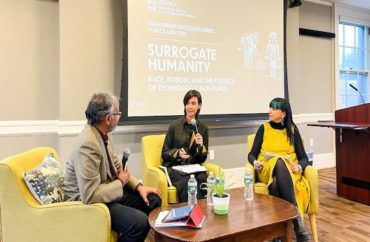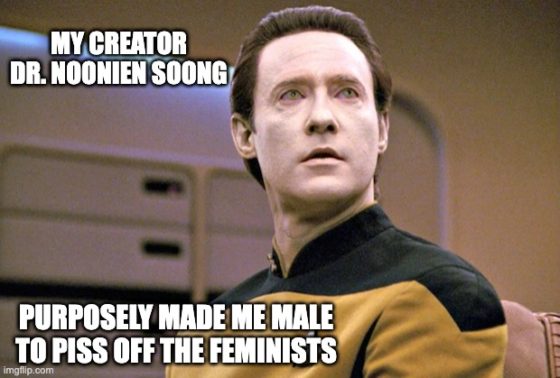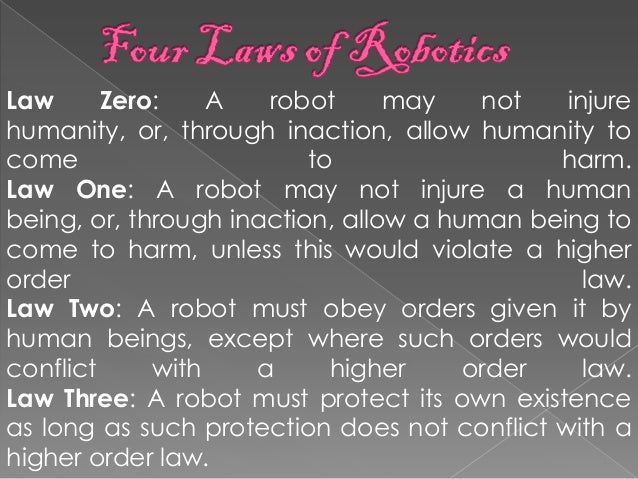
What’s the first thing you think of when someone mentions robots? “The Terminator”? “The Matrix”? Data from “Star Trek: The Next Generation”?
Most normal folk likely would offer one of those … and perhaps “Battlestar Galactica,” “The Day the Earth Stood Still” and Isaac Asimov’s books.
Will they become self-aware and take us over? we wonder.
But if you’re on staff at a women’s, gender & sexuality studies department, mechanical beings might have you ponder how they “intersect with race, patriarchy, colonialism and capitalism.”
On March 2, Brown University’s Center for the Study of Race and Ethnicity in America hosted two professors from such a department (University of Maryland-College Park and Yale) who did just that.
According to the event’s description, Neda Atanasoski and Kalindi Vora (pictured) “trace[d] the ways in which robots, artificial intelligence, and other technologies serve as surrogates for human workers within a labor system entrenched in racial capitalism and patriarchy.”
They also noted “while these new technologies and engineering projects promise a revolutionary new future, they replicate and reinforce racialized and gendered ideas about devalued work, exploitation, dispossession, and capitalist accumulation.”
In an interview before the event, Atanasoski said it’s important to make sure advances in technology don’t just keep “reproducing what we already have.” As an example, Vora noted the U.S. military’s Atlas Robot which can “independently navigate complex terrain, lift heavy objects and recover itself after falling.”

As such, Vora alleged that Atlas “employs fantasies of human autonomy and command, together […] values that we identify with the often violent history of globalism. These robots […] fulfill the fantasy for (a perpetuation) of enslaved labor. They cannot rebel.”
MORE: ‘Robo-sexism’ talk at Cornell to tackle sex-gender stereotypes in robots, AI
“The goal of technological labor,” Vora continued, is “the reproduction of ‘labor performed by … marginalized workers of the past.’”
Vora, a “History of Consciousness” PhD who once ran UC Davis’s Feminist Research Institute, was dubbed a “spectacular” hire by Yale last year where she taught the course “Science and Technology Studies: Anti-racist and Feminist Approaches to Technoscience.”

Atanasoski claimed that the design of “mainstream social robots,” in particular their “emotional expressions,” is derived from Charles Darwin’s theory “that only white Europeans could control their emotions, while people of color could not.”
Of course, humanity’s advances with automation have always been about lessening the burdens on ourselves. Race, gender, sexuality have little to do with it, else Atanasoski, Vora and others would be complaining about how dishwashers are a metaphor for hyper-masculine fantasies about stay-at-home mothers.
If you’d like to seriously ponder situations where humans have to deal with sentient mechanical beings, the pinnacle is the Asimov’s “Robot” and “Foundation” books.
Asimov is famous for creating the Three Laws of Robotics, which are designed to prevent a “Terminator” and “Battlestar Galactica” (reimagined series)-style robotic takeover. In the mid-1980s the prolific author added a fourth law, the “Zeroth Law,” which allows man’s artificial servants to look out for humanity as a whole.

This ultimately leads to a rather different sort of robot takeover: In order to keep humanity from self-destructing, robots operating under the Zeroth Law devise methods to clamp down on human ingenuity and motivation … leaving mankind’s galactic empire of 20,000 years from now the ultimate status quo.
Their ultimate goal is to turn the Milky Way into a massive human hive-mind, the supreme defense against any extragalactic threat.
MORE: University researchers warn that we’re biased against black robots
IMAGES: Brown Daily Herald/Twitter screencap; YouTube screencaps
Like The College Fix on Facebook / Follow us on Twitter







Please join the conversation about our stories on Facebook, Twitter, Instagram, Reddit, MeWe, Rumble, Gab, Minds and Gettr.